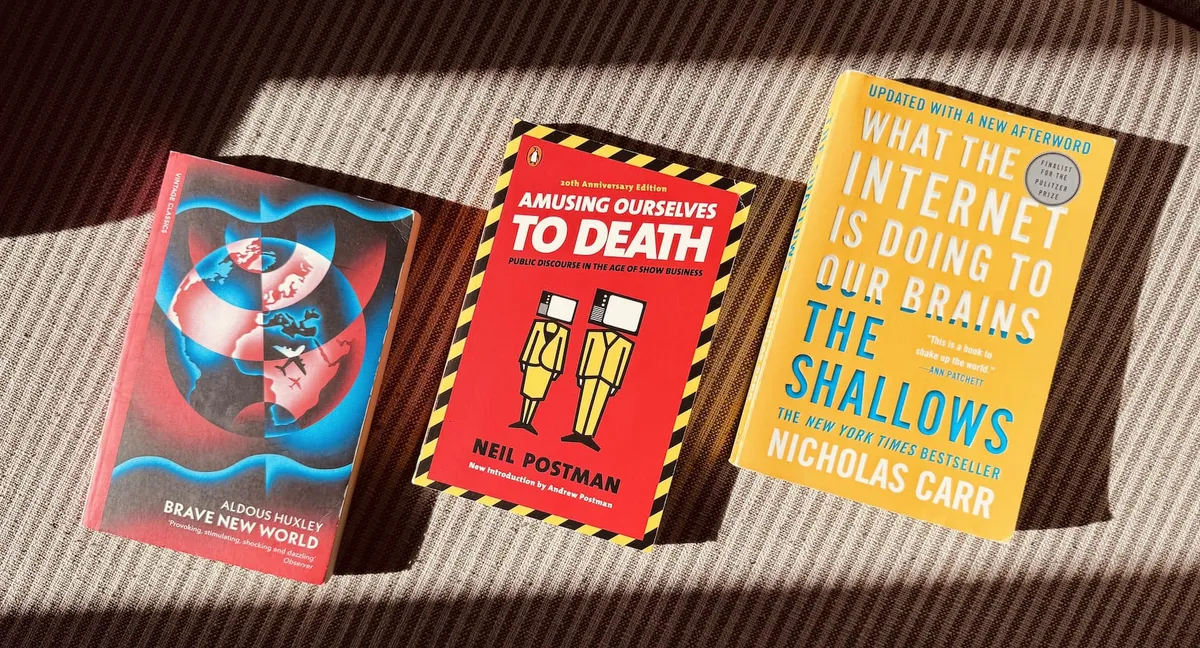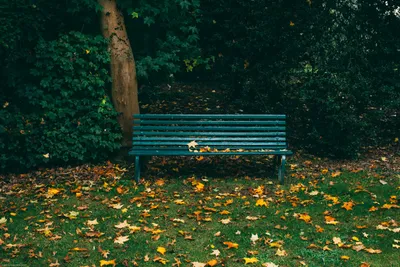
Four Books to Reclaim Your Focus in a World of Distraction
Does this feel familiar? A day packed with tasks, yet you end it with a hollow feeling of “what was the point?” This is a core symptom of a quiet epidemic of emptiness spreading through our society. It’s the condition of modern life where we have traded the substance of our lives for the mere activity in them, often for conveniences we never asked for. We allow our tools to dictate our attention, and this trade-off, while promising ease, often leaves us feeling adrift. To understand and navigate this reality, we can turn to powerful critiques that, despite being from different eras, saw it coming with startling clarity.
Brave New World by Aldous Huxley (1932): The High Cost of Easy Happiness
Aldous Huxley’s Brave New World presents a different kind of dystopia. Here, society is controlled not by fear, but by pleasure. Through genetic engineering, psychological conditioning, and a constant supply of entertainment and a happiness-inducing drug, the population is kept docile and content, sacrificing individuality and deep relationships for superficial stability.
Why it’s worth reading: Huxley’s novel is a powerful critique of consumerism and the pursuit of happiness at all costs. It directly confronts the modern trap where we mistake productivity for purpose and fleeting pleasure for genuine fulfillment. This book is a must-read for anyone questioning the sources of their own happiness and the trade-offs we make for comfort.
1984 by George Orwell (1949): The Fight for Truth in a World of Noise
George Orwell’s dystopian masterpiece, 1984, imagines a totalitarian society where the ruling Party controls every aspect of life, most insidiously, the truth itself. Through constant surveillance (“Big Brother is watching you”) and the manipulation of information, the state maintains its power. The novel serves as a chilling reminder of the dangers of censorship and propaganda.
Why it’s worth reading: In our modern world, we are bombarded with information, and it can be challenging to discern fact from fiction. 1984 encourages a critical examination of the information we consume and the narratives that shape our understanding of the world. It highlights the importance of seeking out truth and the personal freedom that comes with independent thought.
Amusing Ourselves to Death by Neil Postman (1985): When Entertainment Becomes Our Reality
Neil Postman’s non-fiction work, Amusing Ourselves to Death, argues that the shift from a print-based culture to a television-based one has fundamentally altered our public discourse and our ability to think critically. Postman contends that television, with its emphasis on visuals and entertainment, has turned serious subjects like politics and news into a form of show business, leading to a more superficial and less informed society.
Why it’s worth reading: Written before the advent of the internet, Postman’s arguments are even more prescient today. This book provides a powerful lens through which to view our current media landscape, where algorithms built for engagement reward what is loud and divisive, burying the empathy required for real community. It challenges us to be more mindful of how we consume information and to seek out media that encourages deep thinking.
The Shallows by Nicholas Carr (2010): What the Internet is Doing to Our Brains
Nicholas Carr’s The Shallows directly confronts the impact of the internet on our cognitive abilities. Drawing on neuroscience and historical examples, Carr argues that the internet, with its constant distractions and encouragement of shallow browsing, is rewiring our brains for superficial understanding and diminishing our capacity for deep, focused thought. The book suggests that online reading often leads to lower comprehension compared to reading a printed page.
Why it’s worth reading: If you’ve ever found yourself struggling to concentrate on a long article or feeling a constant need to check your notifications, The Shallows will resonate deeply. It provides a scientific basis for these feelings and encourages readers to be more intentional about their use of technology to preserve their ability to think critically and reflectively.
The World Today: Orwell’s Surveillance Meets Huxley’s Triviality
Reading these books today reveals a startling truth: we are not living in Orwell’s world or Huxley’s world. We are living in a disorienting blend of both, with the limited benefits of either. We have willingly adopted the tools of surveillance Orwell warned us about, carrying tracking devices in our pockets and sharing our lives on public platforms where connection becomes performance. Simultaneously, we pacify ourselves with the endless stream of trivial entertainment Huxley foresaw, scrolling through short-form videos and curated feeds designed to provide fleeting pleasure. We face the observation of 1984 without the enforced stability, and we embrace the distractions of Brave New World without the guaranteed happiness.
The Path Forward: Reclaiming Your Life by Living Intentionally
This modern dystopia, one of our own making, can feel overwhelming. But the future is not something that happens to us. It is something we create. The antidote to this epidemic of emptiness isn’t more optimization or a new productivity hack. It is a conscious shift in mindset. We have the power to reclaim our time, focus, and attention.
This journey begins when we have the courage to pause and reflect, moving beyond the noise to rediscover purpose beyond just productivity. It means choosing a deep conversation over the shallow approval of a crowd and investing our energy in what fills our soul, not just what fills our calendar. One powerful tool for this kind of intentional reflection is structured journaling, which can help you process these complex ideas and discover what truly matters to you. The choice begins with a simple, challenging question: What does a life of purpose and connection actually look like for you, and what is one intentional thing you will do today to start building that life?
Note: The links are affiliate links that I earn a commission on when you buy the book.
Related Articles

An Epidemic of Emptiness
A personal essay exploring the modern epidemic of emptiness, its root causes in our relationship with technology and productivity, and how a conscious shift toward intentional living can be the antidote.

Why Blocking Apps Won't Fix Your Phone Addiction
App blockers are training wheels—not the solution. Real freedom from phone addiction comes from fundamentally changing your relationship with technology by finding purpose and using your phone as a tool, not a distraction.

Are You Busy or Productive? Aligning Your Actions with Your Aspirations
Feeling busy but not fulfilled? Learn the difference between busyness and true productivity, and how to align your daily actions with your long-term aspirations.